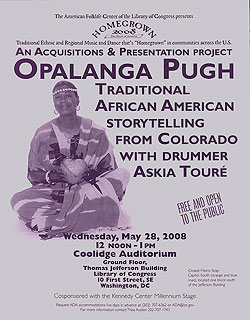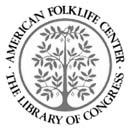| |
|||
|
The American Folklife Center at the Library of Congress presentsThe Homegrown 2008 Concert Series
|

|
Opalanga Pugh is a native of Denver, Colorado, and a storyteller in the African oral tradition. Africans brought their stories with them to America when they arrived on slave ships. "Those stories continued to grow and travel from the plantation to the pulpit, from country to city, and from the South to the wild West of Denver, Colorado," Opalanga explains.
Opalanga follows the pathway, not merely of storytellers who entertain, but also of oral tradition keepers who hold responsibility for remembering cultural history and hosting important rituals and ceremonies.They are referred to as "griot," or more accurately as "jali." When Opalanga travels as a griot/jali to homes, hospitals, festivals, and prisons, she brings stories and ceremonies "to welcome and name our newborn, midwife birth and death, honor our ancestors, and challenge our youth." Many of Opalanga's stories come from her travels in Africa. Others are classic tales of the African American experience. Another set of Opalanga's stories chronicles the lives of some of the first Blacks in the west. As a selfproclaimed "daughter of the dust of Denver," Opalanga particularly enjoys sharing stories from her own mile-high, arid city, especially from historical Five Points, the cultural capital of Black Denver.
Working for the railroad brought both of Opalanga's grandfathers to the West around the start of the twentieth century, and Opalanga grew up in Denver's small but culturally rich African American community. Under her grandmother's tutelage, Opalanga absorbed cautionary tales and proverbs while she learned the ethic of hard work and "how to make a creative way out of no way." The civil rights movement of the late 1960s coincided with Opalanga's high school years. This period of radical social upheaval was a "vibrant, thought-provoking time" for Opalanga. She remembers, "It was a time when I came into my own appreciation of myself as a human being." Along with developing Black consciousness and pride, Opalanga became what she describes as a cultural activist. "I think that's probably the root of the work that I'm up to today," she explains.
In 1974, Opalanga's cultural activism led her to answer a deep call to visit Africa, "the mother of us all." She spent her senior year at the University of Lagos in Nigeria. As she traveled among the Yoruba and other people of West Africa, Opalanga listened closely to the way people shaped language into story and song and witnessed firsthand how tightly storytelling was woven into the fabric of human life. It was in Nigeria that the Coloradan received the name "Opalanga." A college friend's uncle gave her the name, which derives from a Yoruba word meaning "palm tree" and speaks of someone tall and thin with qualities of strength and grace.
Opalanga has traveled as a professional storyteller and griot/jali throughout the United States, Canada, and the Caribbean. She uses story as a tool for personal development, a vehicle for education, and a force for social change. NBC selected Opalanga as one of ten African American Living Legends in 1992. Opalanga has received the Ambassador of Peace Award from the Conflict Center of Denver, and has twice won the Denver Mayor's Award for Excellence in the Arts.
Baba Askia Touré, another Denver native and a member of Opalanga's extended family, uses his voice and drums to add rhythm and fullness to Opalanga's stories. Askia began his journey in music at the age of four or five by playing the flute with his mother. By middle school he was a party disc jockey as well as a performing DJ for his rap music group. A trip to Senegal in 1990 led Askia to intensify his studies in West African rhythms and culture. To learn from the best, he sought out African drum greats in America such as Gordy Ryan, who played the djun djun (African bass drum) with the famous Nigerian drummer Michael Babatunde Olatunji. In 1992 Askia started "Sankofa," a Denver band that fuses African rhythm with jazz melodies.
Askia now teaches in Denver and plays the drum for healing rites and karamus or celebrations. He also answers the call of elders for their “transitionings into the realm of the ancestors.” Askia explains that "through the drum I find solace, order, meaning, and healing." Together, the two artists honor Opalanga's commitment to bringing "traditional wisdom into the heart of the modern world."
Georgia Wier
Folklorist Colorado Council on the Arts
Elkins, West Virginia
 The American Folklife Center was created by Congress in 1976 and placed at the Library of Congress to "preserve and present American Folklife" through programs of research, documentation, archival preservation, reference service, live performance, exhibition, public programs, and training. The Center includes the American Folklife Center Archive of folk culture, which was established in 1928 and is now one of the largest collections of ethnographic material from the United States and around the world. Please visit our web site.
The American Folklife Center was created by Congress in 1976 and placed at the Library of Congress to "preserve and present American Folklife" through programs of research, documentation, archival preservation, reference service, live performance, exhibition, public programs, and training. The Center includes the American Folklife Center Archive of folk culture, which was established in 1928 and is now one of the largest collections of ethnographic material from the United States and around the world. Please visit our web site.
| ||||
